It’s the productivity dream: How to get MORE done but spend LESS time doing it! It’s a dream sold by armies of productivity gurus, and there’s a veritable flood of advice out there. Many of us (myself included) dive deep into fancy strategies with good intentions – totally forgetting to actually get some work done!
And that’s why I’m here to fish you out, with a life-raft stocked with my 14 top high-impact productivity tips for work and studying – to help you sift the real pearls from the silt. They’re perfect for making a difference TODAY.
So, whether you’re a student, business-person, writer … or champion procrastinator: let’s get going!
By William Wadsworth, the Cambridge University trained cognitive psychologist and specialist in how to study smarter, not harder. He leads the world’s largest research study on use of effective learning strategies, is regular exam prep expert for The Times, and hosts the Exam Study Expert podcast, with 1 million downloads to date.
Additional research, graphics and article review by Dr Kerri-Anne Edinburgh
Our mission is to provide reliable content to help learners develop sustainable, healthy habits. To ensure our articles are high quality, we follow a rigorous editorial process from research onwards, and review regularly. To learn more, please see our Editorial Policy.
Part 1: Fitting it all in
Is it really possible to be so productive that there are enough hours in the day? Try these first 7 tips to find out!
1. Have a “no willpower needed” system
If a day’s work means constant decisions about what to focus on next or when to take a break, you’re in for a tiring day.
Instead, make the post of one of my favourite productivity tips, whether you’re working or studying:
You want to have made all those decisions in advance: you need a plan! Answer all the questions: what, when, for how long – so that all you need to do is sit down and get to work. No questions asked.
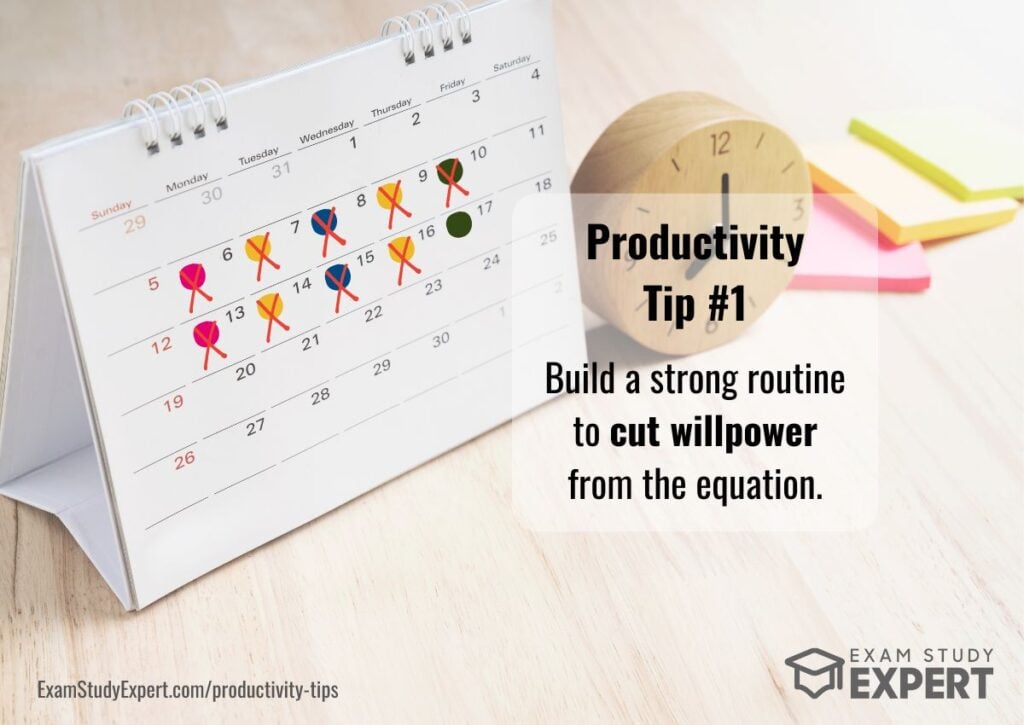
There are two ways to make decisions in advance of your study / work sessions. Hint: you can use either, or a mixture of the two together:
- Get into a fixed (study) routine that you follow every week without hesitation until it would feel weird not to!
- This works great when life is predictable (I’ll do 10 mins of vocab after breakfast, or answer my emails after my 11am coffee)
- Write out your study timetable for the day ahead, or the next few days, then stick to it.
- Sticking to the short-term is great when life is feeling variable!
2. Manage your “mental energy units”
We all know there are a limited number of working hours in the day (about 8-10, for most of us).
But not all ways of using those hours are equal. Some tasks leave us spent after just a few hours!
The book The Power of Full Engagement by Jim Loehr and Tony Schwartz coins the term “mental energy units” to give us a way to talk about this. Different tasks consume or create units:
- Some tasks use up 1 unit per hour: say, studying at steady pace
- Others may use up units faster: a heated debate with colleagues may use up 2 or even 3 units even though it only lasted an hour
- And others, like going for a good walk, or a good chat with a friend – may create units
It’s a pretty neat way to think about managing your energy as well as your time.
So pay attention to how fast different study tasks “use up” your energy, and plan your days accordingly.
3. Batch-process chores where you can
Any expert in running efficient manufacturing processes – from the most high-tech factory plant to the humblest craftsman’s workshop – will tell you that a fundamental principle for increasing output is “batch processing” jobs.
Having one person doing a task in a bigger quantity with greater focus – that’s far more efficient and time-saving than having everyone jump around between tasks.
For example: it’s a good idea to have one team-member go through the process of making a big batch of glue once a week than making 3 smaller pots every day.
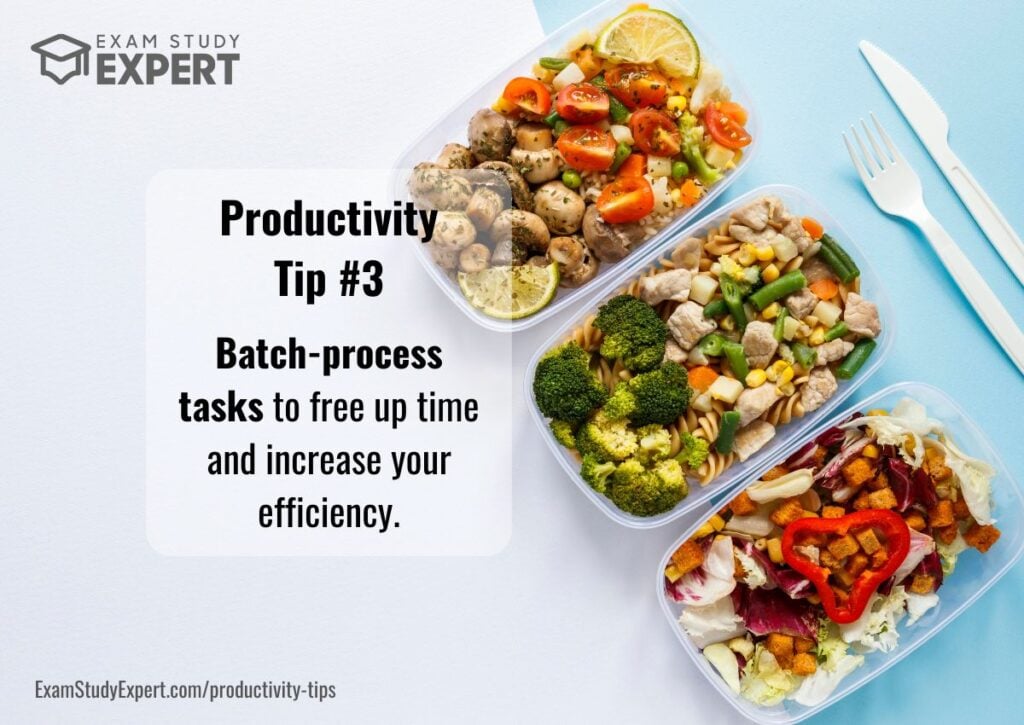
You can apply batch-processing to your own life too, to help free up more time for studying or work:
Batch-cook and freeze meals to last a couple of days. Do a bigger load of laundry once a week. Do your emails once or twice a day, rather than checking all the time. You get the idea.
4. Clear any roadblocks from your path
This productivity tip is all about streamlining the process.
Gather everything you need for your planned study stint or work session before you begin, so you don’t have any unwanted interruptions once you get into the groove. There’s nothing more frustrating than having to stop writing when your laptop battery dies, just as creativity is striking!
- Textbooks and stationery: check
- Monthly reports to review: check
- Laptop and charger: check
- Water and snacks: check
You’re good to go. Wagons roll.
4. Choose (or make) a productive environment
This is one of those tips that might surprise you: it’s definitely winner for increasing study productivity!
Simply put: the environment you work in has a BIG impact on how productive you can be.
You’re looking for somewhere with a studious atmosphere, the right lighting, and a decent worksurface you can sit comfortably at. So, find a study room or library, or carve out a corner at home away from your relaxation spaces.
N.B. I’d urge you to study outside of the room you sleep in if you possibly can. Both halves of your life will be improved: you’ll be able to relax and sleep more easily, and you’ll be able to concentrate and focus better.
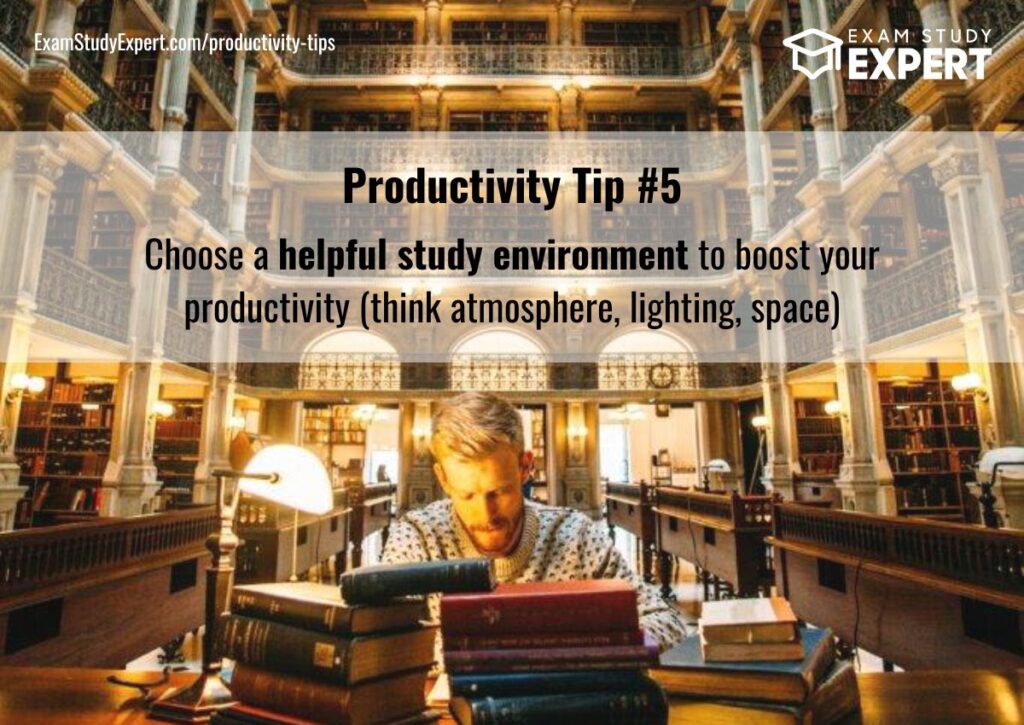
The right atmosphere might depend on what you need to do:
- For hardcore learning, you might want library-like silence
- … or try the sounds of the Bodleian Library at Oxford University for a studious vibe
- For creative writing, maybe the buzz of a coffee shop is what you need to get your mind going
- For online learning or virtual meetings, a pair of noise cancelling headphones can be your best friend
Experiment with different locations, and go for what works well for you!
6. Make it a pleasure
Work doesn’t have to be a chore. Honest!
Indulge in some motivating comforts while you’re studying: listen to good music, and drink good coffee (or hot chocolate).
Though enjoy your comforts responsibly – make sure the music isn’t distracting and the coffee isn’t close to bedtime!
Want to learn more about the impact of music and coffee on studying – we’ve got exactly the articles for you!
And treat yourself to decent stationery, if you can: it’s a much nicer experience to write with a quality pen on nice paper that’s thick enough to stop ink soaking straight through to the back!
7. Taking breaks increases productivity
You can’t work at high intensity forever: you’ll need to take a break to refresh and recharge.
Taking plenty of short breaks is one of my favourite high-impact productivity tips whether you’re a student or at work!
Always get up from your desk on your breaks: a change of scenery and chance to stretch your limbs, if only for a couple of minutes, is vital to help you reset.
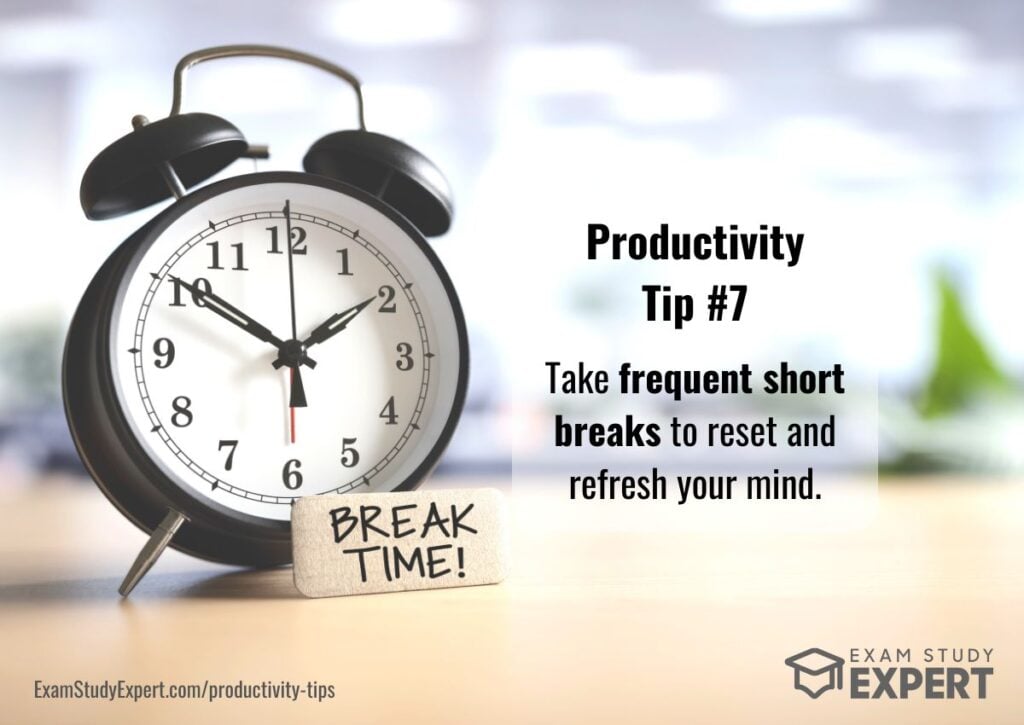
If remembering to take breaks is a struggle, I recommend you try the “Pomodoro Method” – it’s a popular time-management system that works really well for scheduling intense work, study or revision sessions AND breaks.
And it’s a winner for increasing your productivity.
The principle of the “Pomodoro Method” is that you work to a ticking clock: set a timer for a set length of time, work solidly for the duration of that timer, and take a short break when the timer goes off. It works because you have to stick to the schedule of intense work and breaks.
If the “Pomodoro Method” sounds intriguing, check out my Pomodoro Masterlass – it’s got all the answers you need to get an efficient routine set up today!
Part 2: The art of full focus
The next 5 productivity tips are probably my favourite for both students and professionals.
Why? For the simple reason that we’re often so bad at following them! But when we do, the results can be impressive.
8. Your mind is a temple
As a study coach, I often see students filling the space between their ears with all sorts of distractions, worries, and multitasking.
But trust me: you perform much better when you give something your full attention.
And that means being responsible about what you fill your mind with right before/during a work or study session! Finish each task before you start a new one and avoid quick activities likely to create unfinished tasks.
Here’s why: every time you switch your attention from one unfinished task to another, it’s thought you carry over an “attention residue” from the first task. This consumes at least some of your mental resources and means you cannot focus on the second task as well.
Here’s a simple example, and something you can fix right away.
How often do you check email, only to see something you’ll deal with later? Every time you do that, that thought of that email you need to reply to will rattle round in your mind as you try and concentrate on your work.
So don’t do it.
Check email only 1-2 times a day, and never right before you’re about to sit down for a good bout of work, and let your mind enjoy the “fresh air” of being able to fully focus for once! Feeling more productive?
9. Don’t undo the hard work on your breaks
The same goes for what you do on your breaks.
I’ve made a case for needing regular short breaks to maintain intensity of focus, but what you fill them with matter too!
Be careful that what you’re doing on your breaks isn’t going to have a lasting “distraction” effect when you try to get back to work.
It’s not just checking messages: reading the news, watching TV, playing games can all create thoughts that play on your mind when you try to get back to your study desk, distracting you from your work.
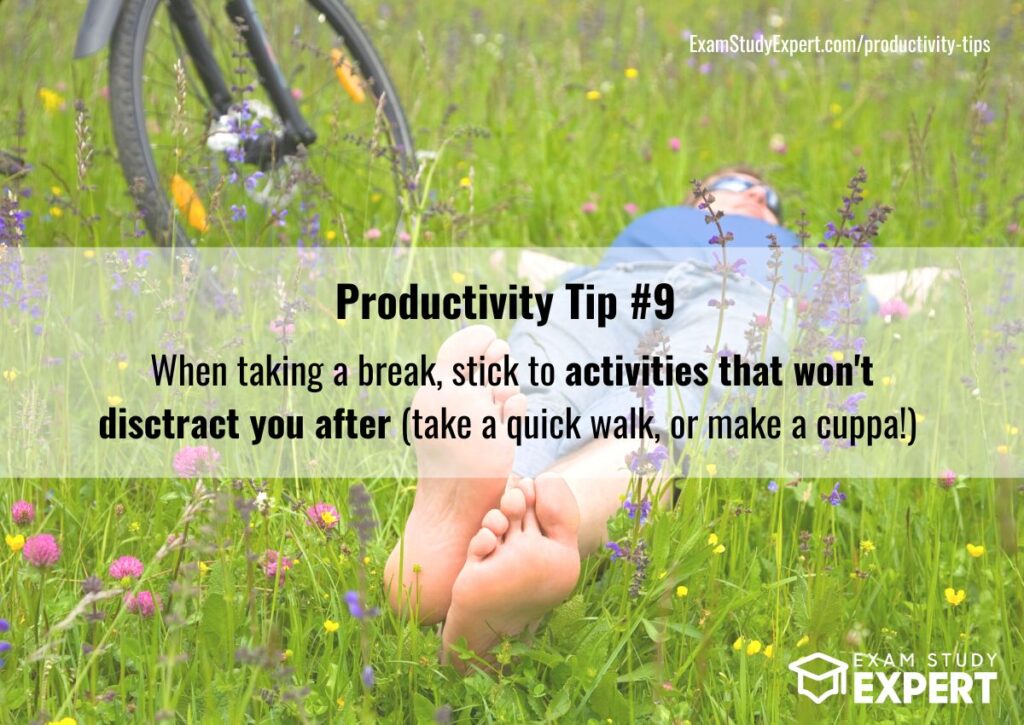
For your short 5-10 minute breaks, try and stick to information-free activities, like making a cup of tea, having a quick wander outside, doing a few press-ups. A quick chat with a friend or study buddy is also OK – provided you stick to pleasantries and don’t get into anything too deep!
10. Please put the phone down
If your breaks should be free from distraction, it won’t surprise you to hear that your work sessions should be too!
And the key culprit: your phone.
Everyone’s telling you to put your phone away when it’s time to work: your college, your tutors; scientists, motivational speakers, productivity gurus. Perhaps we’re all on to something 😉
So what’s the big deal with phones anyway? Well, one study found that students are distracted for an average of 8 whole minutes for every “solid” hour they think they’re spending on their homework – Snapchat, Instagram, WhatsApp, WeChat, Facebook, Twitter, notifications from games apps, it all adds up to way more than you’d think and kills your study productivity.
To put it into context:
If you’re studying for 3 hours a day, that adds up to nearly 3 hours worth of distractions every single week! Just think what you could do with that time…
What’s more, (students take note) research shows that all those distractions can add up to significantly weaker exam performance.
So do yourself a favour: turn that phone off (or put it on mute), and give yourself space to think.
11. Only one thing at a time
By now, you should be familiar with the idea that batch processing is more efficient (tip #3) and finishing a task before you start a new one helps you focus better (tip #8).
So let’s add a third top productivity tip to this group:
Multi-tasking is terrible for productivity. Instead, try “mono-tasking” – focus on just one task at once.
Remember the manufacturing example from #3? Another good comparison is the assembly line, where everyone has just one task to do well. If they were constantly switching between the different parts of the process, they’d always need to be putting down one set of tools and picking up another. That’s slower.
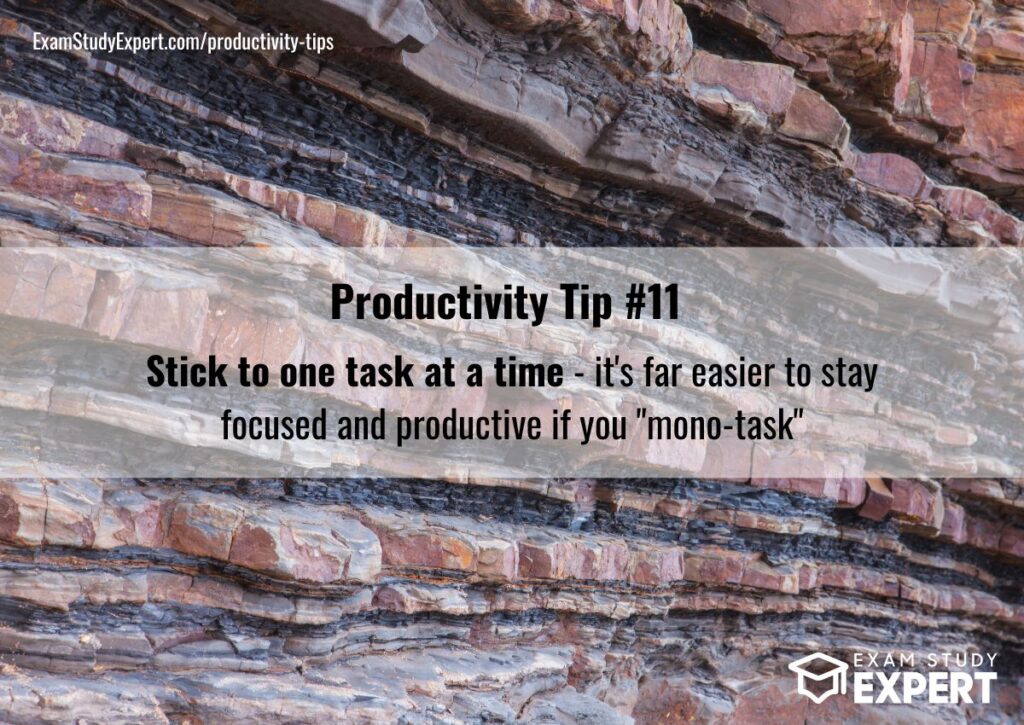
You can apply this assembly line mentality to your work or studies.
It works especially well if you have to do the same task several times during a larger project.
Split up your project into layers of tasks (research, planning, drafting, editing, making charts) and do that one task across several parts of your project. This works great for writers – and theses!
You’ll find your work much more streamlined if you stay in the right headspace and mono-task.
Take essay writing, for example: sure, there will be a little darting between the steps from time to time if you’ve forgotten a key point. But you’ll find it a lot easier to focus on your essay if you build it up, layer by layer, than if you try and do all of the tasks for each paragraph as you get to it.
12. Get your to-do list out of your head
Don’t waste mental space worrying about other things you need to do.
Keep a “distractions list” to hand. (A favourite “quick fix” tip for a productivity boost!)
If thoughts pop into your head – texting your friend back, checking the mailroom for your Amazon delivery, ordering a takeout for tonight – don’t let them sit there, just add them to your list, and get them out of your head.
These tasks are perfect for handling on a longer break (they’re often too distracting for short 5 minute breaks).
Worrying about a bigger to-do? Add it to your plan for the day – or your study routine for tomorrow (tip #1). It will have a time and place, no need to think about it. Easy.
Part 3: When the work stops…
These last two productivity tips are perfect for those times when your mental energy is spent and you just can’t work or study any more:
13. If you must “procrastinate”, at least make it productive!
We’re not machines: there will come a time each day when your mind wanders off more than usual, or you just can’t bring yourself to get back to your desk after a break.
Perhaps you’ve used up all your “mental energy units” (tip #2) for the day!
When this happens, have a back-up plan for low-effort “procrastination activities” you can do instead. These are tasks that still need doing but aren’t exactly important studying or work projects.
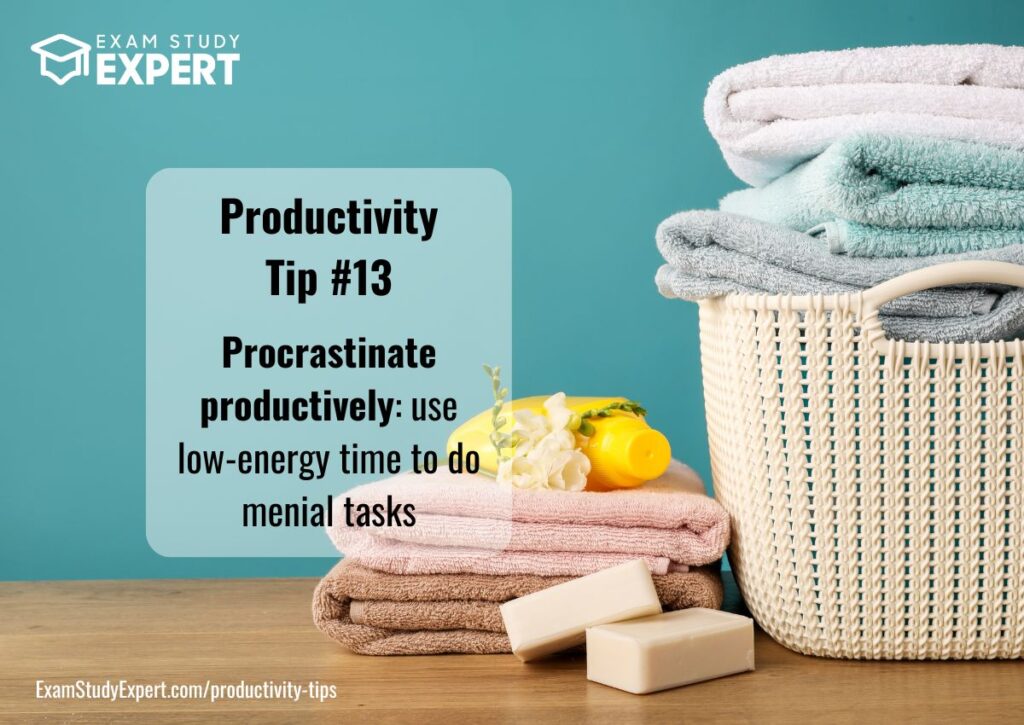
Maybe it’s a good time to get the laundry done. Or go shopping for supplies. Or call Grandma.
It may not be Plan A, but it’s still productive. (Just be alert for this sort of thing happening too often – or too close to a deadline!)
14. Celebrate your success
Always pat yourself on the back after a good day’s study.
Celebrate your achievements, and tick off all the little boxes on your to-do list.
Part of the art of productivity is knowing when enough is enough, when it’s time to stop. You’ve done good work today: time to call it a day and relax.
Well done – a productive day’s work!
Before you go:
On a productivity roll? Keep procrastination at bay by trying out some of our popular, simple study hacks – perfect for streamlining your study sessions!
We love it when you leave us a comment: let us know which of the tips above you’ve tried out – and whether it made a big impact!
Whether you’re a student or professional, if you’ve enjoyed these productivity tips, why not: sign up below to receive the free 10-page guide to the EXACT system I recommend for memorising large amounts of knowledge, fast. It’s a science-backed formula I truly believe in!
As always, my friend, wishing you every success in your studies!

By William Wadsworth, the Cambridge University trained cognitive psychologist and specialist in how to study smarter, not harder. He leads the world’s largest research study on use of effective learning strategies, is regular exam prep expert for The Times, and hosts the Exam Study Expert podcast, which has 1 million downloads to date.
Author Profile | About Us | Editorial Policy | Contact Us



Hi, my name is Kamdyn. I am a senior in high school and I have a hard time staying productive when it comes to my schoolwork. I’ve looked up many different ways to stay productive but I can’t find one that seems to stick. My question is does anyone have personal ways to stay productive that may possibly help me?
very informative
Love it!! I have used this method before, but now I have a few extra tips that will help me! I’m a teacher, a parent, and now a student again so thus will be very helpful!
Hey Shelley – great to hear it! Good luck with the studies, and hope you have fun being the learner rather than teacher for a change 🙂